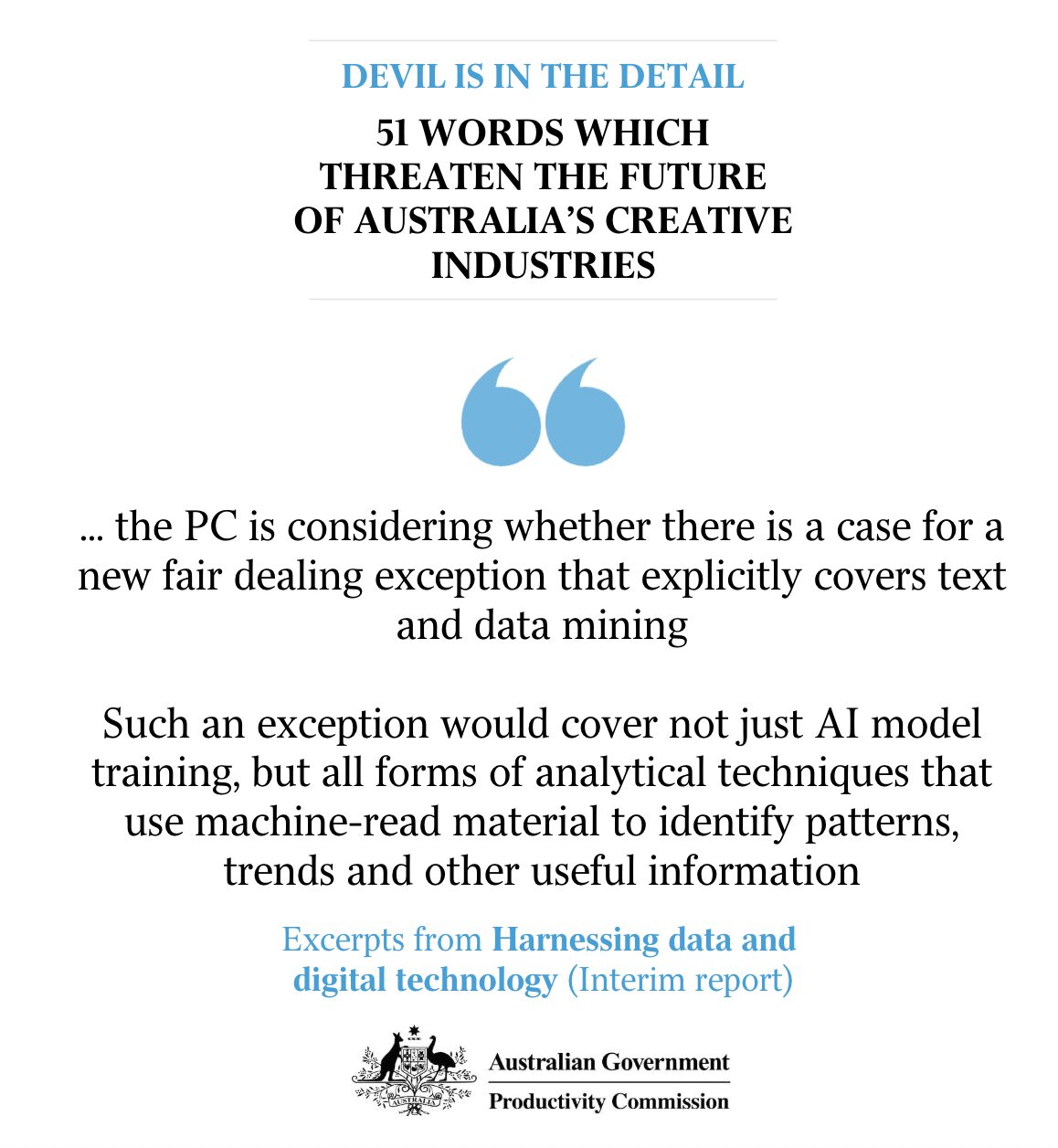The 51 words threatening the future of Australia’s creative industries

Pic via Getty Images
The Productivity Commission has proposed giving tech giants free access to a vast library of copyrighted Australian content for AI, sparking fears creators will miss out on compensation for their work.
Words by James Madden for The Australian
Big tech companies would gain access to a vast library of copyrighted Australian content to further fuel their AI capabilities under recommendations put forward by the Productivity Commission, with the controversial scenario likely to leave the nation’s news media outlets and creative professionals without compensation for their work.
In an interim report on “unlocking the benefits of AI and data to spark growth”, released on Tuesday night, the commission called for feedback on what reforms were needed to bring the copyright regime up to date, amid its concerns that the laws were outdated and ill-equipped to deal with the rise of artificial intelligence technology.
Possible overhaul of the laws is expected to prompt a fierce backlash from industry leaders, many of whom have previously aired concerns that big tech routinely sourced content it did not own as a means to further its products, without compensating the owners of the copyright.
In a submission to the report, arts advisory body Creative Australia expressed concern about the unauthorised use of copyrighted materials to train AI models.
“Much of the data has been used reportedly without consent from the original creator, and without acknowledgment or remuneration,” the submission says.
“The global nature of the technology industry has made it difficult for the owners of creative work to enforce their intellectual property rights and be remunerated for the use of their work.”
Last week, KPMG chairman Martin Sheppard and chief executive Andrew Yates warned the Albanese government that distrust of AI was “not without basis”. Two days later, the Media, Entertainment & Arts Alliance called for greater government intervention on AI, with a new survey revealing high level of concern in the media, creative, and entertainment sectors regarding the technology.
As part of the wider recommendations in the interim report, the commission finds that while the full effects of AI on productivity are still uncertain, AI “will likely add more than $116bn to Australian economic activity over the next decade”.
“It recommends an approach to regulation that limits the risks that AI presents without stifling its growth potential,” it says.
In a recommendation set to anger the news media and creative industries, the report’s summary reads: “The government should check for gaps in current regulation exposed by AI and, where possible, amend that same regulation to fill them. AI-specific regulation should only be considered as a last resort.”
The report recommends exploration of “whether current Australian copyright law is a barrier to building and training AI models”.
The report acknowledges that “copyright violation is an example of a harm that AI could exacerbate by changing economic incentives”, but suggests tweaks to the laws that would grant exemptions – under the guise of “research or study” – to big tech companies wanting to improve the data libraries of their AI models.
“There are concerns that the Australian copyright regime is not keeping pace with the rise of AI technology – whether because it does not adequately facilitate the use of copyrighted works or because AI developers can too easily sidestep existing licensing and enforcement mechanisms,” the report says.
One of the policy options suggested is to amend the Copyright Act to include a fair-dealing exception that would cover “text and data mining” – a move that would potentially grant technology companies wider access to the works and content produced by Australian journalists, artists, authors, and musicians, to name a few.
AI specific regulation is rare globally, although last week the developers of leading AI models such as OpenAI, Google and Microsoft agreed to abide by rules on transparency, copyright and safety across Europe.
The commission flags several options, including: “no policy change”, under which copyright owners would continue to enforce their rights under the existing framework, including through the courts; introducing measures to facilitate licensing of copyrighted materials, such as through collecting societies; or amendments to the Copyright Act to include the fair dealing exception.
While text and data mining – methods that use automation to analyse large volumes of text and data to identify patterns – is considered “fair use” in relation to copyright use in some overseas jurisdictions, it is seen as a flawed model that can leave legitimate copyright holders short-changed. “It should also be noted that a TDM exception would not be a ‘blank cheque’ for all copyrighted materials to be used as inputs into all AI models,” the commission says. “The use must also be considered ‘fair’ …”
The commission warns against introduction of too many onerous legislative requirements on big tech’s AI advancements. “It is the PC’s view that the copyright issues posed by AI can also similarly be resolved through adapting existing copyright law frameworks rather than introducing AI-specific regulation,” it says.
This article first appeared in The Australian as Giving AI a licence to eat up Australian artists’ content
Related Topics
UNLOCK INSIGHTS
Discover the untold stories of emerging ASX stocks.
Daily news and expert analysis, it's free to subscribe.
By proceeding, you confirm you understand that we handle personal information in accordance with our Privacy Policy.









